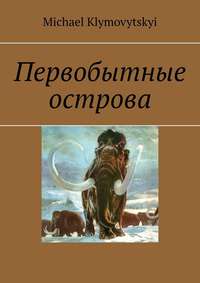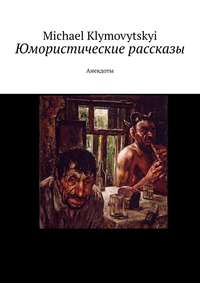
Полная версия
Stone Age

Stone Age
Michael Klymovytskyi
© Michael Klymovytskyi, 2020
ISBN 978-5-4498-0255-2
Created with Ridero smart publishing system
Stone age
Part 1. Stone age
Father, son and tiger.. Father and son hid in the bushes of laurel cherry trees on the edge of the brook. They were hunters, new people from the South. They watched the caves on the slope of the mountain, dug by ancient people of the Stone Age. The father and son of an eight-year-old boy were armed with wooden boomerangs and spears with obsidian tips. The Great Steppe stretches beyond the limits of the beam from the Black Sea to the Valdai and from the Carpathians to the Altai Mountains. For millions of years, the steppe was repeatedly covered by the waves of the Middle Ocean, from which the Crimean and Caucasian mountains rose, dividing it into the Black, Azov, Caspian and Aral Seas. In some parts of the steppe there are islands of relict subtropical forests, deciduous and coniferous trees. In the Kargin interglacial time, on the edge of retreating glaciers, steppe flowed into the tundra. All this variety of vegetation gave birth to a variety of wildlife, a mixture of northern and southern animals, residents of steppes, forests and tundra of the quaternary period: wild, tarpan horses, steppe bison and tours, giant deer and mammoths wandering in the steppes of thousands of herds. They attracted predators: cave lions and bears, big wolves and people. People lived in the northern part of the steppe. They dug caves on the slopes of hills and beams or occupied entire caves on the slopes of mountains, so they were also called cavemen. The Father and Son watched the settlement of such people. Unlike cavemen, they were taller, dark-skinned, with curly hair. Thin skins covered their bodies. The cavemen had short, strong hands, a low, inclined forehead, large eyebrows and a nose. The eyes were small and deep. The neck was short, and the big head seemed to grow right out of his shoulders. They did not have a chin, and black or red hair covered their head and body. The father and son saw cave hunters with sticks and torches coming out of the camp to set fire to the grass and take the grazing animals out to the cliffs by the river. Later, the women and children left the caves and began to descend to the creek. This is exactly what the new hunters were waiting for, having prepared boomerangs for head shots. But they were not alone in an ambush. When his father smelled a saber-toothed tiger, which was also hiding in the bushes on the edge of the beam, he smelled a natural smell. The women were moving away from the fires that burned in the caves day and night. A saber-toothed tiger jumped to the bottom of the ravine like a huge lynx. A minute later, a tiger jumped out of the ravine with a woman in her teeth next to her father and son. It was too late to run to the river, and they were hiding, hoping that the wind would not blow in their direction. With sword-like fangs, the tiger ripped the victim’s chest, broke his ribs, ate his heart and lungs, and began to eagerly take blood in his long tongue. On the other side of the ravine people came to their senses and started throwing stones at it. First, he did not pay attention, and then quietly disappeared into the bushes, leaving the victim behind. The father and son lifted her up. Cave hunters shouted from the rocks above the river, but the father and son were already far away, by the river where the raft was hidden.
The boy’s mother, a woman, met them on an island near a sand spit. She was naked, and her big breasts, unlike the cavewomen, were hairless. Apparently, the cave hunters liked this feature of the new bodies, and sometimes they stole these women and kept them in their homes. The chief of the island tribe came out from behind the trees, the only man with gray hair, approached the victim of father and son and made a sharp sound resembling the hissing of a saber-toothed tiger. Then, with one axe stroke of obsidian, he cut off the victim’s head and carried it to the fire. The remains of the body were removed by the women for soaking in cold water before cooking, as the wild tribes in New Zealand now do. The main prey of the island’s inhabitants was fish, which they killed with spears from trees growing above the water, or caught with wicker baskets tied to branches. On the other side of the island, a forest river flowed into the Dnieper River, the water of which was warm and abundant. A big pike and bream jump out of the water, waiting for them in the cold jets of the Dnieper, a three-meter catfish. Small fish jumped to sandbanks, where they were collected by children.
The cave bear This time the Father and Son hid in the branches of the oak tree, which stretched from the river to the Dry Balka. Here the Dnieper has dismembered a rocky massif. The ridges formed the first large thresholds, which, like the teeth of a giant animal, protrude from the water, waiting for their victims. In some places new people put tree trunks between the stones, holding them together with vines, clinging to them and jump over the stones. Father and son move here from the island. The open ancient plateau was covered with salt from the ancient sea and then in the steppes with hills of manganese and iron ore nodules. Salt attracted ungulates and countless herds and herds came here. A flock of wolves, cave lions and bears waited for them here. The cave bear, who lived in the cracks of the cliff, was the full owner of the Dry Ravine. He looked like a brown bear, his relative, but was a third bigger, on his hind legs he was above 3 meters. Only he was not afraid of ice water, and one night he went to a small island and killed and ate all those who lived there. This monster was being watched by the Father and the Son in the hope that if he noticed them, they would flee through the branches of the trees to the doorway, where the bear could not pass. While hunting, the bear waited for the buffalo herd to surround the salt exits, then frightened the animals with a thunderstorm, and when they ran along the girder, he met them, trying to kill some. The Father and Son heard this roar before they saw a black bear carcass covering one of the running cows, but this time the bear failed; a huge buffalo chasing Him put a meter of horns in his side. With a terrible roar the bear turned and hit the bison with huge claws on its head, but it was too late, the fountain of blood hit the bear from a deep wound. He hit the bull a few more times, and everything was quiet. A flock of bison, frightened to death, fled to the steppe. No less frightened, the father and son rushed to the island. The chief and shaman of their tribe decided to skin such a bear immediately. Almost all the hunters ran after the Father and the Son on the battlefield. But they were the only ones to know about the bear’s battle with the buffalo. The cave hunters heard a roar and guessed about the great prey. In the steppe met two detachments. Cavemen howled like a big pack of wolves, but it did not help them. Obsidian axes and boomerangs defeated sticks and teeth. The killed enemies were eaten, and the slimmer children were taken from the caves to the island.
And the caves were empty for thousands of years.
Three hunters could lie along the entire length of the catfish.
Southern plants and animals are extinct or gone. But in the spring mammoths came to fresh grass.
Ice Age
When the onset of spring drags on, it seems that winter will be forever, as in the ice age. Mish was telling his son.
Over the last million years of the existence of planet Earth, there have been several ice ages, and the latter ended about 10 thousand years ago, and maybe not yet. In the middle phase of the last ice age, glaciers on land reached Kiev. They ice bound large rivers of Europe, Asia and North America, which seemed streams flowing from the giant tongues of ice. And in America, under the hundred-meter thick ice, there were Great Lakes, or rather they were not.
Deer and wolves
Three hunters from the Mammon tribe, Father and two sons, had been watching the plain covered with ice for several days. This steppe stretches along the edge of the southern seas and mountains and stretches to the icy mountains of the Great Glacier, where no one lived and where life went. These were the people of the elite of the time, when groups of Neolithic hunters still roamed on Earth, but tribes of pastoralists capable of taming animals have already appeared. With the hunters there was a large flock of tamed wolves. They differed from their wild relatives in black and white color and tails slightly twisted upwards. The flock was supposed to cut through a large herd of reindeer and drive in the direction the hunters needed. The main role was the leader of the pack of large white wolf, more than a meter at the withers. Perhaps he was a descendant of the first wolf tamed by the Father of the tribe. Deer were larger than modern deer. They looked like moose with very branched horns in males (up to two meters wide).
Конец ознакомительного фрагмента.
Текст предоставлен ООО «ЛитРес».
Прочитайте эту книгу целиком, купив полную легальную версию на ЛитРес.
Безопасно оплатить книгу можно банковской картой Visa, MasterCard, Maestro, со счета мобильного телефона, с платежного терминала, в салоне МТС или Связной, через PayPal, WebMoney, Яндекс.Деньги, QIWI Кошелек, бонусными картами или другим удобным Вам способом.









